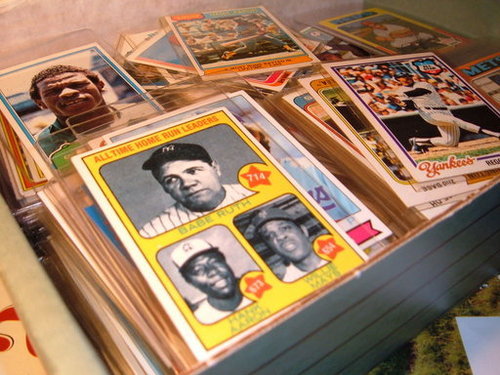A Case for Minimalism
A Case for Minimalism

As written previously, I moved. During the move I condensed down a lot of my stuff to. I had about eight boxes of old stuff. Teddy bears, college notes, graduation gowns, jerseys of my favorite boyhood sports’ heroes, etc. I condensed everything down to just one sentimental box and took pictures of the stuff I wanted to review for memories. It felt great.
It wasn’t easy for to bring in my old velveteen rabbit to charity. But I was hoping that just maybe I was making a difference it someone else’s life. That rabbit was in great shape. Maybe some little boy or girl with cancer will receive and it’ll improve their life? I don’t know.
I did end up losing something that had real monetary value and sentimental value. I had a stack of about 50 or so old sports’ cards that I can’t find. Michael Jordan cards from the 80’s, an old Joe Namath card, some baseball cards from the 50’s, old Nolan Ryan’s, Joe Montana, Frank Thomas rookie, autographed Cal Ripken. Gone. This wasn’t intentional. Maybe I accidentally threw them away? I’m not sure. But the lose stings.
If I had never owned them, the loss wouldn’t sting. The stuff wouldn’t own me. Now, let me be clear on something. I realize that this sounds similar to the things those people say who avoid relationships for fear of getting hurt. I’m not suggesting that you don’t own anything. I’m just suggesting that as an entrepreneur you need to evaluate what you buy, what you own, and how you spend your time. You must be nimble and agile. Stuff can just weigh you down. After all, at the end of our lives, the stuff stays here. Memories matter. Focus on creating memories.
One of my favorite lists on the ownership of stuff:
It clutters our space, causing distractions and stress.
We must constantly move it to get to other stuff, to clean, to organize, to paint walls or decorate or remodel.
We must take it with us if we move, and often if we travel. That’s a ton of trouble and costs.
Often we pay for extra storage, outside in our yards or in storage facilities.
If it breaks, we will often take it to be repaired.
If we have kids or pets, we have to worry about it getting broken, or scold them for not being careful with it.
If we get used to it, and it breaks, we’ll replace it because we think we need it.
If it gets old and crotchety, we have the headache of putting up with a less-than-functioning tool.
If we have too much stuff, it weighs us down, emotionally.
We get attached to our stuff, creating an emotional battle when we consider giving it up (whether we actually give it up or not).
If we have too much stuff, we live in a cramped space, and don’t have room for our other stuff.
Too much stuff causes more messes and is harder to clean.
We might trip over stuff and hurt ourselves.
If we don’t trip over it, we must worry about that each time we pass by the item.
If we went into debt buying the stuff, we must deal with all the pain and worry of that debt, added to other debt.
Even if we don’t go into debt, there’s the added burden of dealing with the financial transaction in our checking registers or financial software, or reconciling it with the bank statement. If we even bother, because sometimes it’s just too much.
It gives us a false sense of security.
It reduces the time we have to spend doing things, instead of worrying about, cleaning, maintaining, using, and working to pay for stuff.
It reduces the quality of the time we do have.
At some point, we must worry about (and spend time and money on) getting rid of the item. This means time and money spent on Ebay, Craiglist, a yardsale, giving it to a charity or friend or relative (and the driving required to do that), taking out a classified ad, dealing with buyers, and so on. A real headache.
If you die and leave your stuff, your relatives will have to deal with all of it. A real headache indeed.
If, goodness forbid, a natural disaster happens, or your home gets burgled, you’ll have to deal with the emotional loss of stuff.
You may enjoy:
Twitter: @jprichardson
-JP
If you made it this far, you should follow me on Twitter. Follow @jprichardson
-JP